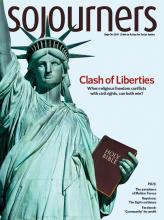PRAYER, FASTING, and advocacy are all spiritual disciplines—ones that we need right now. Several faith leaders came together this spring to call our brothers and sisters in our diverse faith communities to tie these three spiritual disciplines together “for such a time as this.”
What kind of time is this? We are living in a time when vulnerable people in the United States and around the world are facing tremendous threats from this administration and this Congress—threats that will be on vivid display in the budget debates that will consume Congress after Labor Day:
Read the Full Article

Already a subscriber? Login
